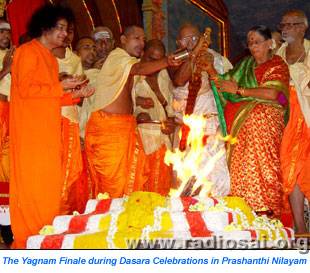 |
 |
 |
 |
| Volume
3 - Issue 10 OCTOBER 2005 |
|
CHAPTER - 6 1. Continuing His Discourse on Atma Jnana or the Knowledge of the Self, Krishna says to Arjuna, ‘I am now going to tell you something about attitudes, and the regulation of the Mind. People use the word Mind Control but I prefer the term Self-regulation as the word Control worries many people, especially when the Mind is involved. Let Me start with attitudes first.’ 2. ‘Going back to the Karma Yogi (a spiritual seeker on the path of action), let us ask what precisely should be his mental attitude. A true Karma Yogi will never be concerned about the outcome of what he is doing nor aspire for the fruit of action. Totally focused on doing his duty, he would always have the feeling that it is the Lord’s work that he is doing. On the worldly plane, he might actually have a boss who is giving the orders. He might also get a salary but for him, all those are purely incidental.’ 5. ‘To continue, the true Karma Yogi has no craving for neither success; nor does he become depressed when there is a failure; he accepts both success and failure with perfect equanimity. Never a castor-oil face for him! He always says, “It is all Lord’s Will. In God’s play, there is never any failure, and everything happens the way it is supposed to. I am merely His instrument.”’ 6. ‘Since there is no hankering after success and all that, there is detachment and a spirit of renunciation in the Karma Yogi. So you see, you do not have to wear ochre robes to renounce! He alone is a true renunciate who has given up
attachment and desires, and not the one who wears saffron-coloured robes and
is called a Sannyasi.’ 9. ‘Let Me now turn to equanimity. I have already told you that the man of Wisdom can be distinguished by his equipoise. Ever calm and gentle, he cannot be easily ruffled.’ 10. ‘The same is in fact true of a Karma Yogi also. That is because he accepts every happening as ordained by God. Thus, his mental attitude slowly conditions him to an attitude of equanimity in its own way. Whereas the Sankhya Yogi (a spiritual seeker on the path of wisdom) acquires equipoise through enquiry and by overcoming delusion, the Karma Yogi allows equipoise to grow over him in due course by training himself to accept everything as a gift of God.’ 11. ‘At the end of it all, a true Karma Yogi is hardly distinguishable from a SankhyaYogi. Now do you see that it is really not necessary to split hairs and make a big fuss about the difference? The paths may appear different but the end result is the same. Just that some may find one path easier than the other – that’s all.’ 12. ‘Yoga literally means union with God, and a Yogi is one who becomes united with God. Now why is union with God so important? Because true happiness or rather Bliss is union with God, that’s why!’ 13. ‘May be I should digress here a bit and say something about happiness. You will agree that no one in the world would want to be miserable, even for a moment. Even a mad man would not have such a desire!’
To Be Continued…. |
| You can write to us at h2h@radiosai.org |
Vol 3 Issue 10 - October 2005 |
Optimized for Netscape and Firefox. Best viewed in Internet Explorer - 1024 x 768 resolution. |

 8.
8.